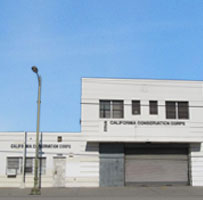What can PVJOBS do for you?
PVJOBS director Juan Alvarado discusses the philosophy behind the PVJOBS program, how it operates, and what the program means for its many clients.
Relics of the post-WWII era still stand tall along Main Street – air raid sirens. Although they were originally installed to alert Angelinos of an impending air strike, they have been configured to serve as part of the statewide Emergency Alert System. During the 1992 Los Angeles riots, certain public services were stretched beyond their limits and while some eventually expanded, some were discontinued. Listen to find out how the city responds to crisis, whether it be natural disasters or urban unrest.
Famliy-owned, Word of Life Christian Bookstore, is celebrating 50 years of operations on Main Street. The family owns three location in Los Angeles and is considered one of the largest outlets for Christian literature in Southern California.
Robin Alvarez, a former member of the historic Los Angeles gang The Playboys, leads us on a trip down Main St. and through his life as a gang banger.
A group of men and women sit waiting for a chance at a job. There are both men and women here, some young enough to be college students, others old enough to their parents. It is a feeling most are familiar with – they have all come here with the hopes that this will be the opportunity that nets them steady, long-term employment.
The place they've come to isn't hiring, however, not directly anyway, and they're not your average job seekers. Some are single fathers and mothers; some are on welfare. Some have spent time homeless, living on the streets. Others are former alcoholics and drug addicts. It was not that long ago that some were in prison, a few for decades or longer.
This Thursday morning they have come to Playa Vista Job Opportunities and Services on Main Street to attend a mandatory orientation session needed to secure a one-on-one interview with PVJOBS. PVJOBS is a non-profit organization that works with at-risk individuals to help them train to start a new career in construction or a construction related field. The goal of the program is to identify potential interests and skills in candidates, and then place them in jobs, apprenticeships, or training programs that will provide the necessary training and on job experience to support a career.
Indeed, many have accomplished just that. Juan Alvarado, director of the Core Program at PVJOBS, said he has seen more lives turned around than he can count in his 10 years with the program. “Our history is filled with many success stories,” he said. “Some are very compelling.”
Walt Edwards came to the program after serving a four year prison sentence for burglary. After his release Walt was referred to PVJOBS, which placed him in a two week construction training program and then found him his first on-site job. Today he works as a construction site foreman.
“The reward of this job is more than just the pay,” he said. “It's what supports my family and my life.”
Alvarado points out, however, that candidates must be committed to a lifestyle overhaul, which can be difficult. Applicants to the program must face at least one “barrier to employment”. These barriers include lack of a high school diploma, a history of substance abuse, homelessness, and history of involvement in the justice system, among others. Individuals with that kind of trouble past can be “at times very difficult to service,” Alvarado said.
As such, to be considered for placement through PVJOBS one must be referred through an associated advocacy organization, of which there are over 100.
After candidates attend the mandatory orientation session, they are eligible for for a one-on-one interview. Upon completion, candidates are entered into a data base organized by where they live and what skills and interests they have. PVJOBS will place workers in appropriate job openings, and can also provide assistance in joining unions when applicable.
Alvarado says the goal with every accepted candidate is to assist them in securing a minimum of 3000 hours of work.
“When a person is placed through PVJOBS,” said Alvarado, “we commit ourselves to providing them with 3000 hours in order to allow that individual to make a wise decision – an experience-based decision – as to what field or endeavor he would like to pursue as a career.”
Many come to PVJOBS looking for work, however, and it can be difficult to convince new contractors to hire through the program. In order to promote the hiring of at-risk workers, PVJOBS has pushed the City of Los Angeles and other municipalities to afford tax breaks and other incentives to contractors and developers who work with PVJOBS to provide job placement.
Since its founding in 1998, PVJOBS has provided 3,500 jobs from more than 1000 different contractors. Still, the realities of the economy, especially in recent years, have had their effect on the program.
“In the history of PVJOBS, we've had some 13,000 people come through PVJOBS,” Alvarado said. “Unfortunately, we're not capable of providing 13,000 jobs.”
In spite of difficulties posed by the economy PVJOBS continues to work to place as many workers in as many jobs as possible. Alvarado says the mission of his organization is essential to improving the lives of his clients. Even if PVJOBS cannot help find long-term employment for a client, he is committed to keeping them on the job in some capacity.
“When you are talking about people who have been involved with the justice system, the most important denominator in keeping people out of prison is employment.”





